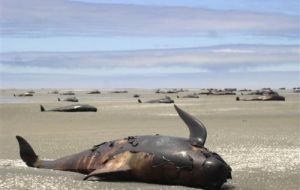MercoPress. South Atlantic News Agency
Millions of tons of plastic debris in oceans lethal threat for whales and dolphins
 Dead whales ingested with plastic have appeared in seas round the world
Dead whales ingested with plastic have appeared in seas round the world Millions of tons of plastic debris dumped each year in the world's oceans could pose a lethal threat to whales and dolphins, according to a scientific assessment to be presented at a key international whaling forum this week.
A review of research literature from the last two decades reveals hundreds of cases in which cetaceans - an order including 80-odd species of whales, dolphins and porpoises - have been sickened or killed by marine litter.
Entanglement in plastic bags and fishing gear has long been identified as a threat to sea birds, turtles and smaller cetaceans.
For large ocean-dwelling mammals, however, ingestion of such refuse is also emerging as a serious cause of disability and death, experts say.
In 2008, two sperm whales stranded on the California coast were found to have a huge amount - 205kg in one alone - of fish nets and other synthetic debris in their guts.
One of the 15m animals had a ruptured stomach, and the other, half-starved, had a large plug of wadded plastic blocking its digestive tract.
Seven male sperm whales stranded on the Adriatic coast of southern Italy in 2009 were stuffed with half-digested squids beaks, fishing hooks, ropes and plastic objects. In 2002, a dead minke whale washed up on the Normandy coast of France had nearly a ton of plastic in its stomach, including bags from two British supermarkets.
“Cuvier's beaked whales in the northeast Atlantic seem to have particularly high incidences of ingestion and death from plastic bags,” notes Mark Simmonds, author of the report and a member of scientific committee of the International Whaling Commission (IWC), which meets this week from July 11-14 on the British island of Jersey.




Top Comments
Disclaimer & comment rules-

Read all commentsEven worse for turtles, whose food - jellyfish - look just like plastic bags to them.
Jul 12th, 2011 - 09:34 am 0See Brasil's Project Tamar: http://en.wikipedia.org/wiki/Projeto_TAMAR
and the Lighthouse Foundation:
http://en.wikipedia.org/wiki/Projeto_TAMAR
Commenting for this story is now closed.
If you have a Facebook account, become a fan and comment on our Facebook Page!